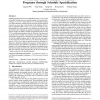96 search results - page 2 / 20 » Improving Multi-agent Based Scheduling by Neurodynamic Progr... |
124
click to vote
PLDI
2012
ACM
13 years 5 months ago
2012
ACM
Parallel programs are known to be difficult to analyze. A key reason is that they typically have an enormous number of execution interleavings, or schedules. Static analysis over...
138
Voted
PLDI
1995
ACM
15 years 6 months ago
1995
ACM
Traditional list schedulers order instructions based on an optimistic estimate of the load latency imposed by the hardware and therefore cannot respond to variations in memory lat...
125
Voted
IJAOSE
2010
15 years 1 months ago
2010
CASO is an agent-oriented programming language based on AgentSpeak(L), one of the most influential abstract languages based on the BDI (Beliefs-Desires-Intentions) architecture. ...
132
Voted
CCIA
2009
Springer
15 years 3 months ago
2009
Springer
Abstract. This paper presents J-MADeM, a new market-based multi-agent approach devoted to perform social simulations with BDI agents. J-MADeM is available as an open-source library...
103
Voted
ACTAC
2007
15 years 2 months ago
2007
An o-line scheduling algorithm considers resource, precedence, and synchronisation requirements of a task graph, and generates a schedule guaranteeing its timing requirements. Th...


